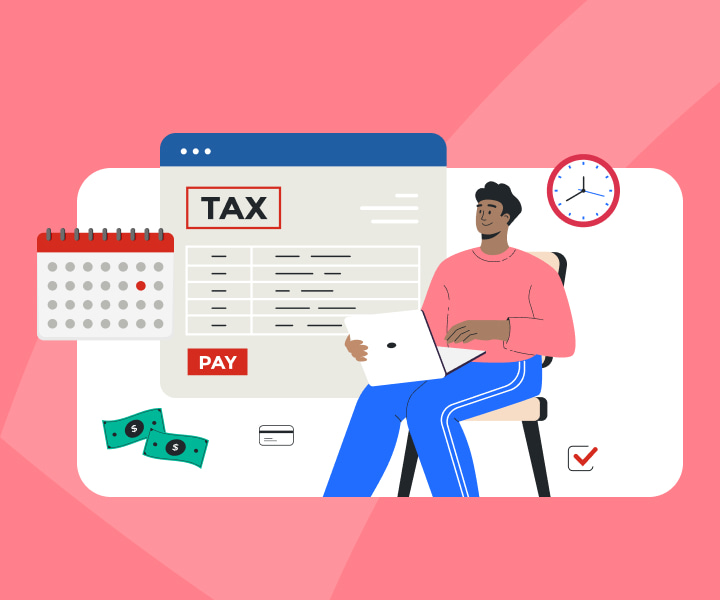Income Tax Rates for the Self-Employed
TurboTax Canada
September 15, 2020 | 3 Min Read
Updated for tax year 2025

Canadian Income Tax Rates Are the Same for Sole Proprietors and Employed Individuals.
When you are self-employed as a “sole-proprietorship” there is actually no difference between you and your business as far as the Canada Revenue Agency (CRA) is concerned. All money you earn in the business goes towards your total income earned on line 15000. What this means is that the income tax rates for sole-proprietors are the same as for individuals.
Self-Employed Canadians Can Claim Business Expenses
“The CRA allows self-employed individuals to claim a host of expenses provided they are used to generate income and are reasonable,” explains Ronald Watson, chartered accountant in Fort Erie, Ontario. “Income tax rates for the self-employed individual are the same as personal tax rates for employed workers. With a small difference,” Watson adds. “Someone who owns their own business has deductions that are more than the average wage earner.”
- The income earned from self-employment can be from a sole proprietorship or a partnership.
- However, if your business is incorporated, it is not considered a self-employment situation.
2025 Federal Income Tax Rates for Self-Employed Canadians
If you’re self employed as a sole-proprietorship or partnership, you must file your personal income tax return and pay the same amount of tax as any employed wage earner. Your business income, after deductions, is considered your annual wage, you report it as professional or business income on a T2125 form.
| Tax rate | Taxable income threshold |
|---|---|
| 14.5% | on the portion of taxable income that is $57,375 or less, plus |
| 20.5% | on the portion of taxable income over $57,375 up to $114,750, plus |
| 26% | on the portion of taxable income over $114,750 up to $177,882, plus |
| 29% | on the portion of taxable income over $177,882 up to $253,414, plus |
| 33% | on the portion of taxable income over $253,414 |
Don’t forget to consider the Provincial Tax Rates
Each province and territory in Canada (other than Quebec), have provincial/territorial tax that is levied (collected) by the CRA.
If you’re curious about your province, go to the Provincial and territorial tax rates section.
Definition of a Business For Income Tax Purposes
The definition of a business under Canadian tax law is “a profession, calling, trade, manufacture, undertaking of any kind whatever or an adventure or concern in the nature of trade.” It must be entered into with a reasonable expectation of turning a profit, and there must be evidence to that extent. The profit you generate from any activity is considered business income and must be declared. A business must also have a definite start date. You can deduct expenses against the profit as of this date. CRA reviews each business on its own merits when defining the business’s start date.
Claiming Business Expenses
“When it comes to claiming expenses against your business income,” Watson notes, “There’s a very broad brush stroke that can be used. Anything that I use to make a profit is potentially deductible.” The CRA allows a multitude of business expenses to be deducted from salaries and benefits, travelling expenses, goods for retail sale, attorney and accounting fees, rent, leases, bank charges and maintenance. If your business is located in your home, you can deduct portions of your mortgage payments, rent, utilities, repairs, upgrades and property tax. The percentage deducted depends on the amount of space you use to carry on your venture. Car expenses may be deductible if you use your car to do business, including lease payments, maintenance, parking and depreciation of the vehicle. All of these deductions help reduce your taxable income and thereby your taxable rate.
You can check the TurboTax link on Business Deductions for more information.
Filing as A Partnership
A partnership does not file income tax on its earnings and is not required to pay tax. The income earned from a partnership is divided between the partners, and each respective partner files her own return. The income, deductions and any other credits or losses are divided according to the partnership agreement in place. Each share of income must be reported whether it was received in cash or as a credit. Special rules apply to a partnership concerning capital gains and losses and recapturing cost allowance. If a partnership is dissolved or an interest is sold or disposed, CRA has special guidelines in place.
References & Resources
- Canada Revenue Agency: Employee or Self-Employed?
- Ronald Watson; Chartered Accountant; Fort Erie; Ontario
- Canada Revenue Agency: Sole Proprietorships and Partnerships
- Canada Revenue Agency: Canadian Income Tax Rates for Individuals – Current and Previous Years
- Canada Revenue Agency: What is a Business?
- Canada Revenue Agency: Reporting Partnership Income
- Canada Revenue Agency: T5013 Partnership Information Return Filing Requirements
Related articles

© 1997-2024 Intuit, Inc. All rights reserved. Intuit, QuickBooks, QB, TurboTax, Profile, and Mint are registered trademarks of Intuit Inc. Terms and conditions, features, support, pricing, and service options subject to change without notice.
Copyright © Intuit Canada ULC, 2024. All rights reserved.
The views expressed on this site are intended to provide generalized financial information designed to educate a broad segment of the public; it does not give personalized tax, investment, legal, or other business and professional advice. Before taking any action, you should always seek the assistance of a professional who knows your particular situation for advice on taxes, your investments, the law, or any other business and professional matters that affect you and/or your business.









